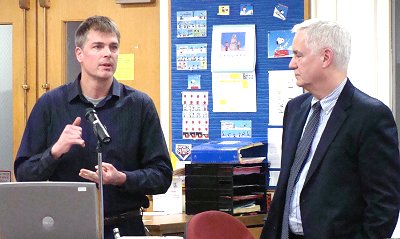- By Dan Veaner
- News
 Print
Print 
AES Cayuga
"As you know things have changed very profoundly over the past couple of years," explained Mareane. "It's the worst economy in our lifetime. Energy demand has fallen with the economy. Much of the demand for energy can now be filled with lower cost energy sources like hydro and natural gas. With falling demand the price paid for energy has fallen, too. Surprisingly, the price of coal has remained stable."

AES Plant Manager Jerry Goodenough (left) and
County Administrator Joe Mareane
Last summer AES asked the IDA to consider changing the PILOT. After a review of the plant's finances, and using the same economy-based methodology that had been used to assess the plant before, IDA officials found that the value of the plant had dropped significantly. Instead of phasing upward from a taxable value of $140 million to $255 million, the renegotiated PILOT would phase its value downward to $100 million over the remaining four years of the agreement.
The Payment In Lieu Of Taxes (PILOT) agreement netted the school district about $300,000 more this year from Lansing's biggest taxpayer. But the renegotiated agreement will mean more than a half million loss in school revenues for next year. It would be about an $800,000 loss if you count the additional money the upward phasing would have yielded.
Mareane characterized the plant's difficulties as 'extraordinary circumstances' that triggered such a quick turnaround. Goodenough outlined the economic factors the plant faces.
"This model has several inputs that are key drivers, and all the inputs went in the wrong direction," he said. "Our capacity factor, which is a measurement of the amount of energy that we could produce versus the amount that we did produce, is normally 85% to 88%. Last year that number was 61%. Energy demand was off, electricity price was off, and our coal price did not come down enough (to impact the other factors)."
He went on to say that the plant was off for five straight weeks for economic reasons, a record for the plant that has been in operation for more than 50 years. He said the plant was entirely black for ten days.
"We saw all of those drivers, capacity factor, fuel prices that didn't quite drop, electricity prices that did drop -- that's 75% of our business," he added. "The remaining part is fixed costs. So we had to implement an emergency plan. We cut our budget by 15% and went from 95 employees to 76."
AES is an international company with over 100 plants, but local plants are set up as independent Limited Liability Corporations (LLCs). Dittman asked whether all of AES's plants are seeing such drops, and Goodenough said yes, at least for the New York plants. Some, he said, were seeing more drastic shutdowns than AES Cayuga has. Dittman challenged Mareane on whether the IDA had confirmed that, saying the corporation could be 'gaming' the county by moving electricity production from this area to another plant where taxes and expenses are lower as a negotiating ploy.
Mareane said he hadn't investigated whether the company was doing that. He noted that AES Cayuga had opened their books to the county, and said they have been a 'great corporate citizen'.

More Bad News: The Lansing School Board
listening to TCAD President Michael Stamm
School board member Glenn Swanson asked whether the recovering economy changes the five year forecast for the plant.
"I haven't seen anything that brings us back to where we were," Goodenough said. "This is not a 'the business is going under and we're going to close.' But this is a 'we have to do some things at our business to figure out how we're going to maintain this market.' I'm not sure I see the bottom, because what gets rolled on top of all this is all the future regulations that are pointed right at coal plants."
Resident Mike Coles, a professional assessor who works with municipalities to, among other things, establish values for PILOT agreements, questioned the value of this one, saying that it had obviously failed in terms of planning and predictability. He asked what the value of the plant would be if the PILOT were abandoned and standard assessment were applied. Mareane said that it would likely be $100 million.
"There is benefit in this PILOT," Mareane said. "But for that PILOT we wouldn't phasing our way from where we are to $100 million. It would happen immediately. I think there is some value in terms of our planning ability and yours in having it phase more gently as opposed to those very abrupt shifts that could happen as a result of a regularly assessed property."
"It's tough, but I think that both parties have operated in good faith," said the Town of Lansing's County Legislator Pat Pryor Wednesday. "At least two people have suggested to me that maybe we should just abandon the PILOT. If we did not have the PILOT and AES had been reassessed this year there would have been a greater reduction in their taxes. That entire reduction would have all occurred in one year instead of spreading out the reduction over a period of years."
Coles says that the one property represents 18% of the total taxable value in the school district and that there is no other property like it. He also warns that once the PILOT expires the $100 million value becomes the base value for the new assessment to 2028. He says that base value will mean reduced school revenues for years to come.
But the Lansing Town Board went on record as saying that the economic model of assessment makes sense in this case. Town Supervisor Scott Pinney says that AES has been historically very supportive to the Town, not only because it pays for 12% of the Town budget in property taxes, but also that plant employees are very supportive whenever local causes are in need. That mirrored school board member Glenn Cobb's assessment. Cobb said that losing this money is challenging for the district, but a lot better than losing all the revenue if the plant were to close. AES Cayuga contributes about 20% of the school district budget.
On Wednesday the Town Board passed a resolution in support of the IDA negotiation with AES.
"We had the bounty when times were good," says Deputy Supervisor Connie Wilcox. "Now we have to support AES."

Mike Coles
Coles says that the IDA wants the affected taxing authorities to endorse the PILOT negotiation process as a way of covering themselves when people are not happy with the result. Pinney says he was approached to personally endorse the negotiations, but thought that a resolution by the entire Town Board would hold more weight. School Superintendent Stephen Grimm says he has no knowledge of school officials being approached to endorse the negotiation.
The bottom line is that the school district will be faced with serious revenue problems going forward. Grimm and others questioned the time line, wondering how the first agreement could even have been signed when the economy actually tanked before the signing. Grimm's greatest concern was the way the phased reduction is front-loaded to produce the greatest drop in revenue in the first of the remaining four years of the agreement.
"I like stability, I like predictability, I like the phasing in, and even the phasing out if there is a decrease," he said. "In poor economic times what I am worried about is that a $30 million drop in the first year, front-loaded like that, could turn our 'funding cliff' into a 'funding gorge.' Having it front-loaded like that is really going to hurt the schools. It just happens to coincide with what is predicted to be one of the worst budget years in '11-'12."
Grimm said that with severe cuts in state aid federal stimulus money filled a 750,000 gap in this year's and next year's budget. But there is no indication at this time that the federal government is considering extending that aid, and New York state finances are not recovering quickly enough to make up for the loss of that federal money. A $30 million drop in the agreed-upon value of AES Cayuga in that same year piles on to that challenge for the school district.
----
v6i4



